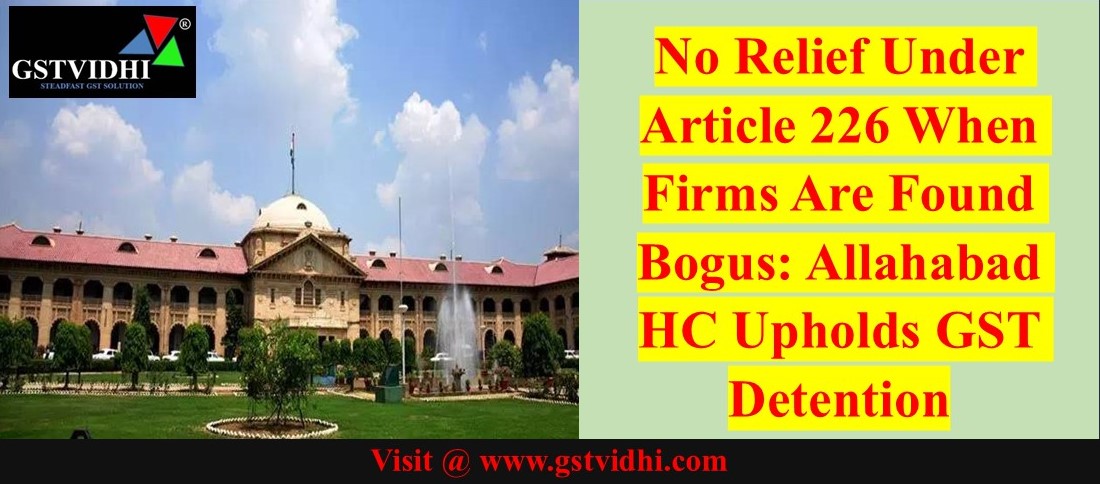
High Court Denies Relief Where Bogus Firms Found Involved in GST
Transit: M/s Riya Enterprises Case
Case Title: M/s Riya Enterprises v.
State of Uttar Pradesh and Others
Case No.: Writ Tax No.
1433 of 2025
Neutral Citation No.: 2025:AHC:46499-DB
Date of Order: 3rd April 2025
Court: High Court of Judicature at Allahabad (Chief Justice’s Court)
Introduction
In a significant ruling
addressing the interplay between jurisdictional procedures and substantive tax
evasion under GST, the Allahabad High Court refused to interfere in a detention
order under Section 129(3) of the CGST/UPGST Act. The case involved allegations
that both the purchasing and selling firms were non-existent and only traded in
fake invoices to generate Input Tax Credit (ITC. The court concluded that
technical arguments regarding procedural irregularities cannot override the
core findings of tax fraud and thus dismissed the writ petition.
Brief
Background and Facts of the Case
On 8th March 2025, an
order was passed by the GST authorities detaining a vehicle carrying TMT
bars weighing 30,300 kg, claiming that the transaction involved was based
on bogus firms. Here are the detailed facts:
- The goods were being transported
through Lodhi Toll Plaza, Robertsganj, Sonbhadra, in Uttar Pradesh.
- Documents produced during transit
included:
- Tax Invoice raised by M/s Atul
Traders, Patna (Seller)
- E-Way Bill with M/s Riya
Enterprises (Petitioner) as purchaser
- The origin of goods was shown as Raigarh,
and destination as Delhi.
However, upon
verification, the authorities expressed suspicion about the legitimacy of both
the purchaser and seller. An inquiry led to the conclusion that both
entities were “bogus” — registered recently and engaged only in bill
trading for fraudulent ITC claims.
Legal
Framework Involved
Key Section: Section
129(3) of the GST Act
This provision pertains
to detention, seizure, and release of goods and conveyances in transit. It
allows for:
- Detention of goods if there is a
contravention of the Act or Rules.
- Release of goods upon payment of
applicable tax and penalty.
The core issue was
whether the proceedings under this section were legally sustainable when:
1. The
jurisdiction of the detaining officer was questioned.
2. The
existence and genuineness of the firms were already disputed.
Petitioner’s
Arguments
Advocate Aditya Pandey,
representing M/s Riya Enterprises, submitted:
1. Lack
of Jurisdiction:
o The
enforcement officers at Sonbhadra had no authority to investigate the existence
of the petitioner, who was registered in another jurisdiction.
o As
per internal State Circulars, such investigations required prior
permission from higher authorities, which was absent in this case.
2. Procedural
Lapses:
o The
findings that the firms were bogus were arrived at post-transaction,
i.e., after detention.
o On
the date of transit, the firms were validly registered, so the movement
of goods was not illegal per se.
3. Request
for Release Under Section 129(1)(b):
o Since
the petitioner accepted ownership of the goods, they were willing to pay
tax and penalty under clause (b) of Section 129(1), which permits
release of goods on such payment without requiring admission of guilt.
Respondent’s
Arguments
State Counsel Shri Ankur
Agarwal opposed the writ on the following grounds:
1. Substance
Over Technicality:
o The
authorities discovered irrefutable evidence that both Riya
Enterprises and M/s Atul Traders were fake entities.
o These
firms were incorporated only recently (29.11.2024 and 27.12.2024 respectively),
had no genuine business activity, and showed no matching data in
GSTR-2A.
2. Genuine
Suspicion of Fraud:
o The
impugned order (Annexure-1 of the petition) clearly records findings
that the entire transaction was a sham.
o Therefore,
arguments about jurisdiction or technical lapses in inquiry hold little
value when the very foundation of the transaction is fraudulent.
Court’s
Analysis and Findings
The Division Bench of the
Allahabad High Court made the following key observations:
1. Findings on the Nature
of the Firms
- The authorities had categorically
recorded that both the petitioner and seller were non-existent.
- Their sole purpose was to engage
in fake billing to illegally avail Input Tax Credit (ITC).
- These were not casual findings,
but were based on investigation and analysis of documents, registration
records, and GST returns.
2. Arguments on Circulars
and Jurisdiction
- The petitioner cited State Circulars
to claim that permission from higher-ups was mandatory before
making such inquiries.
- The Court held that procedural
lapses in issuing inquiries do not nullify the substantive findings
about the firms' bogus nature.
- Mere breach of circular-based
technicalities cannot undo the conclusions drawn on fraudulent conduct.
3. No Interference Under
Article 226
- The High Court refused to invoke its
writ jurisdiction under Article 226 of the Constitution.
- The Court stated that where serious
allegations of tax evasion and fraud are found to be prima facie
true, the High Court would not use its extraordinary powers to provide
relief merely on technical or procedural grounds.
Judgment
The Hon’ble Court
pronounced:
- The writ petition is dismissed.
- The petitioner is free to avail
alternate remedies as available under the GST Act (i.e., file an
appeal or reply under Section 107 or other applicable provisions).
Conclusion
The ruling in M/s Riya
Enterprises v. State of U.P. underscores a growing judicial trend: Substantive
findings of fraud cannot be circumvented by raising jurisdictional or
procedural arguments.
This case reaffirms that:
- Bogus billing, ITC fraud, and paper
entities will face stringent scrutiny.
- Detention orders
under Section 129(3) will withstand challenge if findings about the
fraudulent nature of firms are well supported.
- Writ jurisdiction is not meant to
be a refuge against such enforcement where prima facie fraud is
evident.
Disclaimer: All
the Information is based on the notification, circular and order issued by the
Govt. authority and judgement delivered by the court or the authority
information is strictly for educational purposes and on the basis of our
best understanding of laws & not binding on anyone.
Find the Attachment (Press on Click Here )
Click here